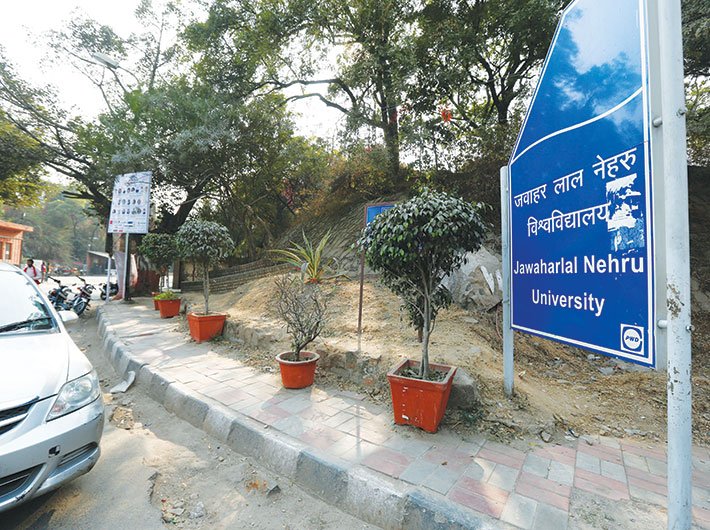At no other moment in the history of Indian national life after Independence the dalits are as oppressed as this moment: dalits are set ablaze, slaughtered like animals on the slaughtering bench of history, and humiliated like slaves in the marketplace in full daylight. When the social hierarchy is interiorised and reduplicated within the institutionalised life of higher education like the university, it assumes the name ‘meritocracy’.
The idea of merit that is based upon the neoliberal logic of quantification, classification and control, through which the capital recharges itself, is now combined with the millennium-long social injustice based upon caste discrimination. This is how in today’s world of extreme capitalism, where only the fittest survives in the life-and-death struggle – and where the idea of merit serves as the paradigm of exclusion and elimination – the social injustice is intellectualised. The neoliberal world of extreme capitalism, thus, has not eliminated social injustice – for example, the caste hierarchy in India – but rather perpetuates it in ever new forms, of which the idea of merit is its latest avatar.
The reduction of knowledge to commodity production, like any other commodities that bear economic values in the world market, is blind and deaf to the burning – and the absolute – question of social justice. It reduces the question of social justice to an issue belonging to the field of conditioned negotiations in the realm of practical politics, while on the other hand, it upholds the idea of merit as a politically neutral one that serves the interest of any and each individual, provided that one has the merit and proves it. This supposed equality, which is actually a homogenisation of singularities into quantitative entities, is, at the same instance – and this is its blind sport – perpetuation of social inequality.
This is, as it has always been, also the truth of the space called ‘university life’: the social injustice is being constantly subsumed and kept hidden – and thus perpetuated – under the supposedly neutral concept of ‘merit’, but the truth is precisely the opposite: the top of the hierarchy will almost always be occupied by not just the economically dominant class but the socially dominant caste. Through the mechanism of merit, the hegemonic apparatus subtly, in the most refined manner possible, keeps the lower castes at the lowest level possible, subjugating them in the most repressive manner, though in the light of the day it does not appear so coercive.
Even in a university like Jawaharlal Nehru University, especially under the current establishment, the work of reduplicating the social hierarchy into the interiorised idea of merit is visible in the most glaring manner, and when this institutionally legitimated idea of merit does not work – when a faculty or a student, for example, is even better than other colleagues even in accordance to the paradigm of merit – coercive force is used by the legitimate authority in the most brutal and corrupt and rotten manner possible.
To give an example: in my own case of promotion, through ‘Career Advancement Scheme’ at JNU from ‘associate professor’ to ‘professor’, the present legitimate authority (who functions like a dictator) used his authority, in the most brutal manner possible, to stop my promotion even though I have fulfilled all academic qualifications. He invoked a criterion of promotion (that only he who has research scholars awarded PhD under his supervision will be promoted) which exists neither in UGC rules nor in JNU rules. At the same time, he has misused his authority to promote another colleague who does not even have PhD scholars working with him.
It is a blatant example of caste discrimination that is possible even in a university like JNU. It only reminds us of the story of the wolf: when it no longer could argue with the little lamb who is drinking spring water the downhill, the wolf argued that even if the little lamb did not pollute the water, his ancestors had done so. The wolf thereby took the liberty to punish the little lamb: it jumped on him and crushed him to death.
The caste discrimination, thus, takes an infinite number of forms, gestures, nuances and shades possible: when arguments work, then it’s fine; when arguments do not work, then force and violence is to be used; in any case, social injustice has to be perpetuated, hegemonic domination has to be reproduced, for reproduction of the condition of production – as the philosopher Louis Althusser insightfully explains – is the very logic of hegemonic domination. The caste question as part of university curriculum, within the closed doors of the classroom, is all that is fine, but the instance it breaks out and wants to transform the social situation, and puts into question unspeakable and barbaric violence of hegemonic forces, then every weapon must be used to stop it.
It is extremely difficult for a dalit to be professor where the caste discrimination rules in such a manner, even though the dalit faculty member has achieved excellence, in so many different ways, in his academic works. The logic of merit is used precisely to stop any dalit colleagues to rise in the professional space, and when even this does not work, then the most corrupt ways will be used to stop the dalits. Here, as elsewhere, the brahminical order is governed by what Friedrich Nietzsche calls ‘resentment’: the illogical logic through which social injustice and social inequality is legitimated and justified is the logic that the wolf gives. And the wolf is full of resentment.
The question of social justice is the absolute and unconditional question. It concerns the very foundation of the historical existence of the Indian nation. No one can evade it by reducing it to a conditioned fulfilment through practical politics. It demands the complete revolutionizing of the Indian society at large.
feedback@governancenow.com
(The article appears in the August 1-15, 2017 issue of Governance Now)
